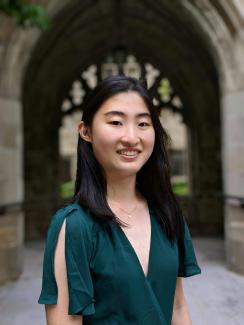
Every year, a number of promising and accomplished music majors in the Department of Music graduate from the College. We are very excited to celebrate the achievements of two of this year's graduates who have received the Leonard B. Meyer Prize for Musical Excellence for their Bachelors theses.

Ellyn Liu, Leonard B. Meyer Prize for Musical Excellence
The Singing Style in Mendelssohn’s Lieder ohne Worte
What is a song without lyrics? And what is communicated in a textless song?
"In this thesis, I explore Felix Mendelssohn's Lieder ohne Worte (Songs without Words) through the application of topic theory in 19th century instrumental music. Following an analytical, historical, and theoretical approach, I investigate a selection of eleven character pieces and the singing style’s signifiers and signifieds. However, the singing style does not exist in a vacuum: other musical topics such as the hunt, spinning-wheel, and barcarolle make appearances in Lieder ohne Worte, implying their own extra-musical references as well. Furthermore, I consider varying degrees of singability ranging from “singable” to “unsingable” — and propose an updated characterization of the singing style that expands upon an ambiguous description by Leonard Ratner in the 1980s. Whether taking the listener on a metaphorical gondola boat ride or to the countryside for a hunt, Lieder ohne Worte provides ample material to explore what it means to sing without words through the lens of topic theory."

Amelia Simonoff, Leonard B. Meyer Prize for Musical Excellence
Face the Music
"Music has a long-standing relationship with emotions. From film music to religious ceremonies, music is often thought to elicit and strengthen emotions. Normally, music elicits emotions in a chain that extends from the composer to the performer to the listener, who is frequently imagined as a passive recipient of the music's in-built, emotion-provoking qualities. It is uncommon for the sound-emotion vector to point in the other direction: a listener's emotions do not usually create sound or music, even if a composer's or performer's emotions can. In this project, I wanted to explore this alternate possibility: What would happen if the emotions of the listener affected the sounding music?
"To that end, I developed a software platform that uses facial recognition technology to read a user's emotions and curates music in response. I adapted the open-source Python library DeepFace to process data from a laptop or phone camera, reading users' emotions in real-time. I then shuttled the facial emotion recognition data via the Spotify Web API to the Web Playback SDK to play music from the user's Spotify account related to those emotions. I set up this project on a Raspberry Pi, continually running the Python script with a camera input and Spotify response as output.
"I then set up the Raspberry Pi in the Media Arts, Data, and Design (MADD) Center at the University of Chicago to make observations about how users interact with this technology."
